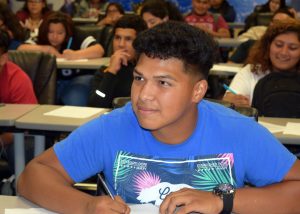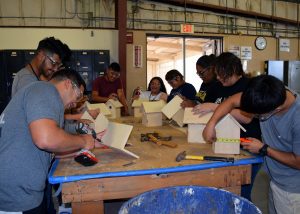(HARLINGEN) – Rudy Tijerina is a rising junior at Raymondville Early College High School. Instead of working the fields this summer, he is attending the Migrant Academic Achievement Residential Summer (MAARS) program at Texas State Technical College.
Since elementary school, the 17-year-old has been traveling to Michigan with his mother and eight brothers and sisters to work in the fields.
“This is the first summer I’m not working, so I can get ahead in my classes,” said Tijerina. “I’ll probably leave after I’m done, though. I have to work so I can help my mom.”
Tijerina is one of 76 students from across Rio Grande Valley high schools who were selected by their migrant counselors and are enrolled in the six-week program and living at the TSTC dorms this summer.
In its fifth year, MAARS is designed to meet the needs of high school migrant and seasonal farm workers in pursuing higher education and to provide community service opportunities.
Students in the program receive two academic high school credits in an attempt to prevent them from falling behind, since most migrants leave before the school year ends and return after school starts, oftentimes affecting the number of credits they earn.
“Our goal with this program is to help high school students graduate on time with their class,” said Neri Balli, TSTC state director for pre-college programs. “At the same time, they get college exposure. Many of these students need to know that college is a possibility.”
Tijerina said he already feels better prepared to tackle his junior and senior years and that TSTC has opened his eyes to the world of engineering.
“I’m really improving in my writing. I needed this extra help, especially if I’m going to pursue engineering in college,” he said. “I’ve learned that writing well is important no matter what field I decide to study.”
In addition to accruing high school credits, MAARS students get to choose two technical courses to explore such fields as building construction, computer networking and business management with three-week rotations.
“This type of college exposure and experience is what opens doors of opportunities for these students,” said Yvette Mendoza, program director for the Center for Science and Math Education.
Mendoza added that MAARS students like Tijerina also receive a $1,200 stipend when they successfully complete the program.
“These students have sacrificed time working and have lost income,” she said. “So these stipends help them.”
For Tijerina, like many of the others, the stipend helps him purchase back-to-school supplies and clothes for him and his brothers and sisters.
“In every way this program has been beneficial and has helped me grow, which will be beneficial to my family in the long run,” said Tijerina. “I hope to come back next year.”
